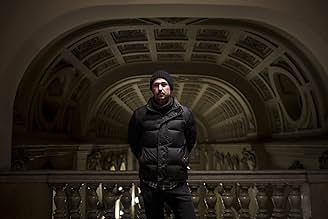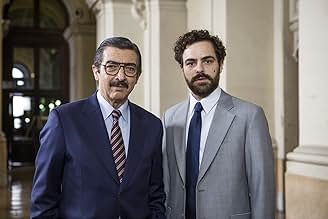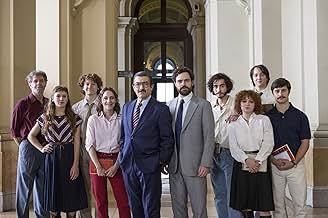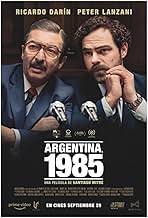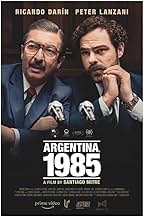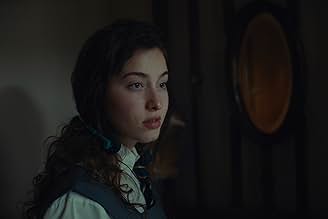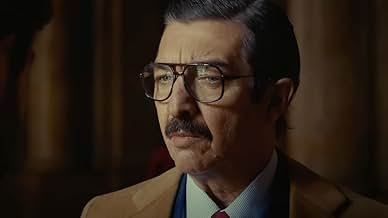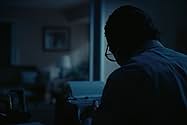AVALIAÇÃO DA IMDb
7,6/10
35 mil
SUA AVALIAÇÃO
Inspirado na história verídica de juristas que, sob ameaças constantes e contra as possibilidades, ousam processar a ditadura militar mais sangrenta da Argentina e embrenham-se numa corrida ... Ler tudoInspirado na história verídica de juristas que, sob ameaças constantes e contra as possibilidades, ousam processar a ditadura militar mais sangrenta da Argentina e embrenham-se numa corrida contra o tempo para fazer justiça às vítimas.Inspirado na história verídica de juristas que, sob ameaças constantes e contra as possibilidades, ousam processar a ditadura militar mais sangrenta da Argentina e embrenham-se numa corrida contra o tempo para fazer justiça às vítimas.
- Direção
- Roteiristas
- Artistas
- Indicado a 1 Oscar
- 49 vitórias e 45 indicações no total
Gabriel Martín Fernández
- Bruzzo
- (as Gabriel Fernández)
- Direção
- Roteiristas
- Elenco e equipe completos
- Produção, bilheteria e muito mais no IMDbPro
Resumo
Reviewers say 'Argentina, 1985' is a powerful film exploring Argentina's military dictatorship trial. It is lauded for strong performances, especially Ricardo Darín, and its emotional engagement. Critics appreciate the balance of tension, humor, and historical accuracy, though some find lacking depth in character development and context. The cinematography and direction effectively capture the era's atmosphere. Despite minor critiques on pacing and bias, it is seen as an important, impactful work resonating with audiences familiar with Argentina's history.
Avaliações em destaque
It's not easy to talk about one of the darkest periods in Argentina's history - including torture, rapes and deaths - and to do it in an appealing way that doesn't become too heavy or exploit the victims' suffering in an abusive way. It's not easy, but they did it.
The script by Llinás and Miter is quite refined, careful and intelligent in the way it addresses all the atrocities of the regime, always saying what it has to say, but it is also intelligent in the way it incorporates moments of humour, a personal and familiar dimension that helps us to identify with the characters, being able to transform everything that happened in one of the most important judgments in history into hope and a turning point. I'm not Argentine. I'm not an easy tear person. However, it is difficult to contain emotions in certain depositions or when in his closing arguments, prosecutor Straessera says "Nunca más" (Never Again). People who have lived under dictatorial regimes or who have heard the stories told by their parents or grandparents cannot remain indifferent to such a moment.
Santiago Miter's direction is super smart too. It's filmed soberly when necessary. It's filmed using movement and different techniques when the action requires it, such as in moments of greater tension, such as during a harrowing dinner with the Assistant Attorney, Luis Moreno Ocampo. The editing is also very efficient, helping a 140-minute film on such a heavy topic - and with much of its time spent in an investigation or in court - pass quickly, using several scenes on the screen at the same time, resorting to overlapping voices and testimonies, resorting to music whenever the film has something to extract from it, not seeming to do anything by chance.
Finally, it is impossible not to mention the excellent actors who make this film. All the supporting actors are at a good level, but the dynamic between Ricardo Darin (as the Attorney General) and Peter Lanzani (as the Assistant Attorney) is one of the highlights, always seeming true and honest, being easy to sympathize and cheer for those characters. Darin could very well have taken a more showy approach, but it is his sobriety and distinct personality that are his greatest strengths.
A must-see film for anyone who cares about the human condition and dignity. A film that recalls that certain pages of history must never be lived again. Nunca más!
The script by Llinás and Miter is quite refined, careful and intelligent in the way it addresses all the atrocities of the regime, always saying what it has to say, but it is also intelligent in the way it incorporates moments of humour, a personal and familiar dimension that helps us to identify with the characters, being able to transform everything that happened in one of the most important judgments in history into hope and a turning point. I'm not Argentine. I'm not an easy tear person. However, it is difficult to contain emotions in certain depositions or when in his closing arguments, prosecutor Straessera says "Nunca más" (Never Again). People who have lived under dictatorial regimes or who have heard the stories told by their parents or grandparents cannot remain indifferent to such a moment.
Santiago Miter's direction is super smart too. It's filmed soberly when necessary. It's filmed using movement and different techniques when the action requires it, such as in moments of greater tension, such as during a harrowing dinner with the Assistant Attorney, Luis Moreno Ocampo. The editing is also very efficient, helping a 140-minute film on such a heavy topic - and with much of its time spent in an investigation or in court - pass quickly, using several scenes on the screen at the same time, resorting to overlapping voices and testimonies, resorting to music whenever the film has something to extract from it, not seeming to do anything by chance.
Finally, it is impossible not to mention the excellent actors who make this film. All the supporting actors are at a good level, but the dynamic between Ricardo Darin (as the Attorney General) and Peter Lanzani (as the Assistant Attorney) is one of the highlights, always seeming true and honest, being easy to sympathize and cheer for those characters. Darin could very well have taken a more showy approach, but it is his sobriety and distinct personality that are his greatest strengths.
A must-see film for anyone who cares about the human condition and dignity. A film that recalls that certain pages of history must never be lived again. Nunca más!
As Argentina begins reckoning with the violent torture and murder of its people by a ruthless military junta from 1976 to 1983, the task falls to prosecutor Julio Strassera (Darin) to prosecute the dictators. The constant death threats are shrugged off by his wife Silvia (Flechner) and children, and his deputy Luis (Lanzani) has no experience but a sharp mind. They assemble an unusually young team and set out to gather evidence of 709 specific crimes, representing thousands. But it seems unthinkable that these still-powerful armed forces leaders will ever be sent to prison.
Witty interaction gives the film a surprising electrical charge, making darker elements even more devastating. Without going into too much detail regarding torture, what's described is absolutely horrific, and scale could have been mind-numbing without such personal filmmaking. This also helps us identify vividly with characters, while seeing this situation echoed in present-day politics as former heads of state face consequences for actions taken when they felt above the law.
Veteran actor Darin makes Julio feel wonderfully competent; even when he's unsure, we know he's on the right track. His sardonic comments bring harsh things into perspective, and he has wonderfully abrasive camaraderie with his family and colleagues, drawing both strength and inspiration. His partnership with the likeable Lanzani's whip-smart Luis develops beautifully over the case. And as Silvia, Flechner adds fabulously sardonic moments that run very deep. Meanwhile, Paredes gets a show-stealing role as a key witness who resiliently recounts a staggering ordeal.
These true events are important in world history, a pivotal change in how leaders are held to account, eventually. A line in the film equates this trial with Nuremberg, but this is perhaps even more earth-shaking. And what sets this film apart is the way a young legal team bonds over their desire to set the historical record straight, because they are the ones who will inherit the leadership of their country. They want it to be a just place to live. Obviously, they're not there yet, but this first step was massive.
Witty interaction gives the film a surprising electrical charge, making darker elements even more devastating. Without going into too much detail regarding torture, what's described is absolutely horrific, and scale could have been mind-numbing without such personal filmmaking. This also helps us identify vividly with characters, while seeing this situation echoed in present-day politics as former heads of state face consequences for actions taken when they felt above the law.
Veteran actor Darin makes Julio feel wonderfully competent; even when he's unsure, we know he's on the right track. His sardonic comments bring harsh things into perspective, and he has wonderfully abrasive camaraderie with his family and colleagues, drawing both strength and inspiration. His partnership with the likeable Lanzani's whip-smart Luis develops beautifully over the case. And as Silvia, Flechner adds fabulously sardonic moments that run very deep. Meanwhile, Paredes gets a show-stealing role as a key witness who resiliently recounts a staggering ordeal.
These true events are important in world history, a pivotal change in how leaders are held to account, eventually. A line in the film equates this trial with Nuremberg, but this is perhaps even more earth-shaking. And what sets this film apart is the way a young legal team bonds over their desire to set the historical record straight, because they are the ones who will inherit the leadership of their country. They want it to be a just place to live. Obviously, they're not there yet, but this first step was massive.
Argentina 1985 and a prosecutor pursues cases against powerful people who were involved in disappearances and murders during the earlier military dictatorship in Argentina.
This is a skilful and earnest political thriller which deals with real events. It took me a while to engage with this film, and I think it would probably have a lot more impact if you are either Argentinian or if you have a deeper knowledge of the events portrayed. It's all very effectively done but is perhaps a bit too long winded and talky at times, so could have done with a more punchy script and little more economic direction. As a comparison, the classic Greek political thriller 'Z' came to mind, and although it's nowhere near as good as that great film, this is a compelling stuff, and definitely it's a story that needed telling.
This is a skilful and earnest political thriller which deals with real events. It took me a while to engage with this film, and I think it would probably have a lot more impact if you are either Argentinian or if you have a deeper knowledge of the events portrayed. It's all very effectively done but is perhaps a bit too long winded and talky at times, so could have done with a more punchy script and little more economic direction. As a comparison, the classic Greek political thriller 'Z' came to mind, and although it's nowhere near as good as that great film, this is a compelling stuff, and definitely it's a story that needed telling.
You've been tasked to prosecute the fascist junta, they've been pulled into the court from their safe bunker, air force, navy and army, assortments of corrupt parties, but you'll feel like you're the hunted, not the hunter.
You'd be forgiven for thinking Ricardo Darin appears in most of the films of Argentine cinema if you only come across the features that receive international acclaim, but there's a good reason for that, and once again he delivers an impressive performance as the state prosecutor building a team and a case against those that destroyed thousands of lives during their vicious and brutal reign.
Coming in well over two hours, I wouldn't let that put you off as the tension builds and insurmountable barriers are removed, the time flies by. A fine piece of factual story telling that leaves more than a sense of satisfaction at the end.
You'd be forgiven for thinking Ricardo Darin appears in most of the films of Argentine cinema if you only come across the features that receive international acclaim, but there's a good reason for that, and once again he delivers an impressive performance as the state prosecutor building a team and a case against those that destroyed thousands of lives during their vicious and brutal reign.
Coming in well over two hours, I wouldn't let that put you off as the tension builds and insurmountable barriers are removed, the time flies by. A fine piece of factual story telling that leaves more than a sense of satisfaction at the end.
Argentina, 1985 is inspired by the true story of the prosecutors Julio Strassera and Luis Moreno Ocampo, who in 1985 dared to investigate and prosecute those responsible for the bloodiest phase of the Argentine military dictatorship, which fell only 2 years earlier. Without being intimidated by the regime, the expert Strassera and the young Moreno Ocampo formed a young legal team of unlikely heroes to wage an unequal battle.
Constantly threatened, together with their families, they fought against time to give justice to the victims of the military junta which in 1976 deposed Isabelita Martinez De Peron in a coup. The members of the junta were tried for crimes committed by the Armed Forces in those years, which resulted in over 30,000 disappeared in December 1985, many were sentenced to life imprisonment. The film has the advantage of effectively reconstructing, in the same places where the facts took place, the difficult investigative work and the four-month trial with 833 eyewitnesses and survivors of clandestine detention and torture centers.
Also using a surprisingly humorous tone, which makes the magistrate (played by an extraordinary Ricardo Darìn) more human, likeable his very young group of lawyers and affectionate his beautiful family reveals the private side of an honest man. The 1985 trial allowed the Argentine justice to recognize and reclaim a long denied right. It inaugurates democracy and condemns the use of violence as a possibility.
When state terrorism takes hold in society, there is always an attempt to annihilate citizens and eliminate the possibility of communication.
Constantly threatened, together with their families, they fought against time to give justice to the victims of the military junta which in 1976 deposed Isabelita Martinez De Peron in a coup. The members of the junta were tried for crimes committed by the Armed Forces in those years, which resulted in over 30,000 disappeared in December 1985, many were sentenced to life imprisonment. The film has the advantage of effectively reconstructing, in the same places where the facts took place, the difficult investigative work and the four-month trial with 833 eyewitnesses and survivors of clandestine detention and torture centers.
Also using a surprisingly humorous tone, which makes the magistrate (played by an extraordinary Ricardo Darìn) more human, likeable his very young group of lawyers and affectionate his beautiful family reveals the private side of an honest man. The 1985 trial allowed the Argentine justice to recognize and reclaim a long denied right. It inaugurates democracy and condemns the use of violence as a possibility.
When state terrorism takes hold in society, there is always an attempt to annihilate citizens and eliminate the possibility of communication.
Você sabia?
- CuriosidadesAfter winning the Golden Globe for best non-English language film, fellow actor Peter Lanzani revealed that Ricardo Darín used his "lucky charm" for awards ceremonies and told the cast and crew to think, "Don't worry, we're not going to win, we have no chance, we're losers, be calm, we won't have to make a speech, we won't win."
- Erros de gravação(at around 43 mins) The taxis of the time had a logo in the shape of a circle with an identification number on the front door. In this scene the taxis don't have any logo except the taxi sign on the roof.
- Citações
Julio César Strassera: History was not made by guys like me.
- Cenas durante ou pós-créditosPhotographs from the trial are shown in the credits.
- ConexõesFeatured in Javo & Temoc: Top 10 Películas: Lo "mejor" del año (2022)
- Trilhas sonorasSalir de la melancolía
Written by Charly García (as Carlos Alberto 'Charly' García)
Performed by Serú Girán
Principais escolhas
Faça login para avaliar e ver a lista de recomendações personalizadas
- How long is Argentina, 1985?Fornecido pela Alexa
Detalhes
- Data de lançamento
- Países de origem
- Idiomas
- Também conhecido como
- Аргентина, 1985
- Locações de filme
- Empresas de produção
- Consulte mais créditos da empresa na IMDbPro
Bilheteria
- Faturamento bruto mundial
- US$ 905.893
- Tempo de duração2 horas 20 minutos
- Cor
- Proporção
- 1.50 : 1
Contribua para esta página
Sugerir uma alteração ou adicionar conteúdo ausente








